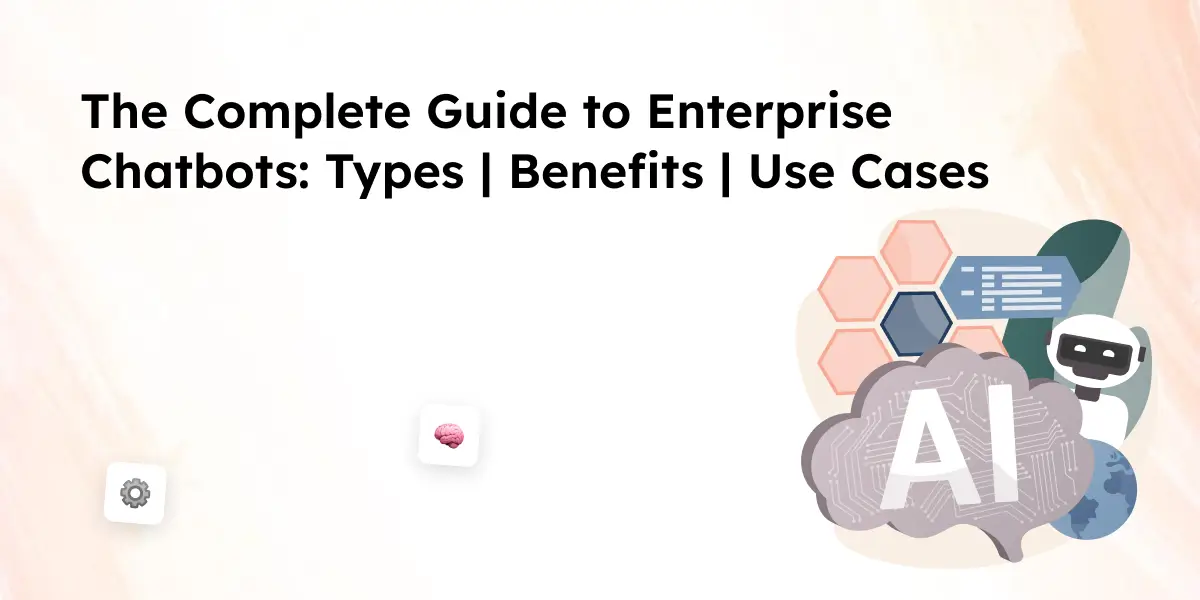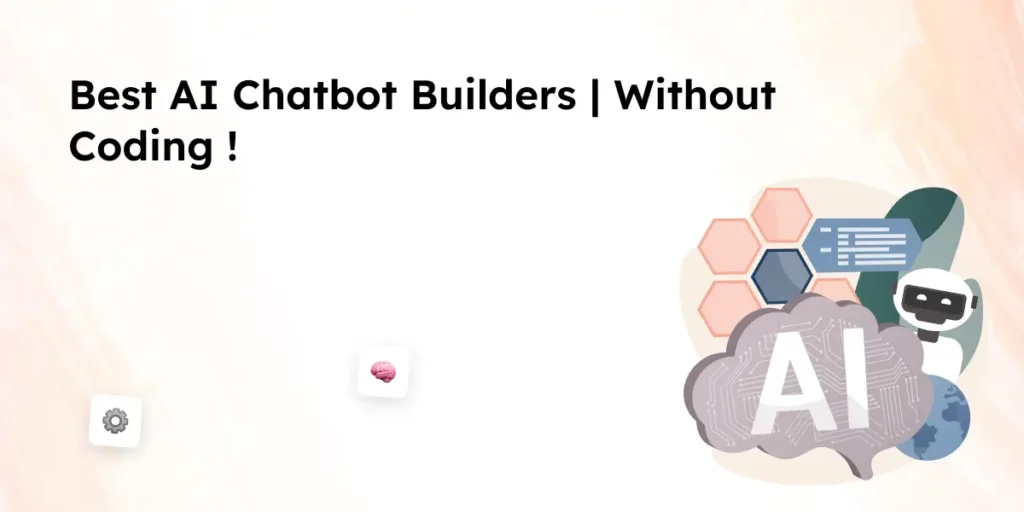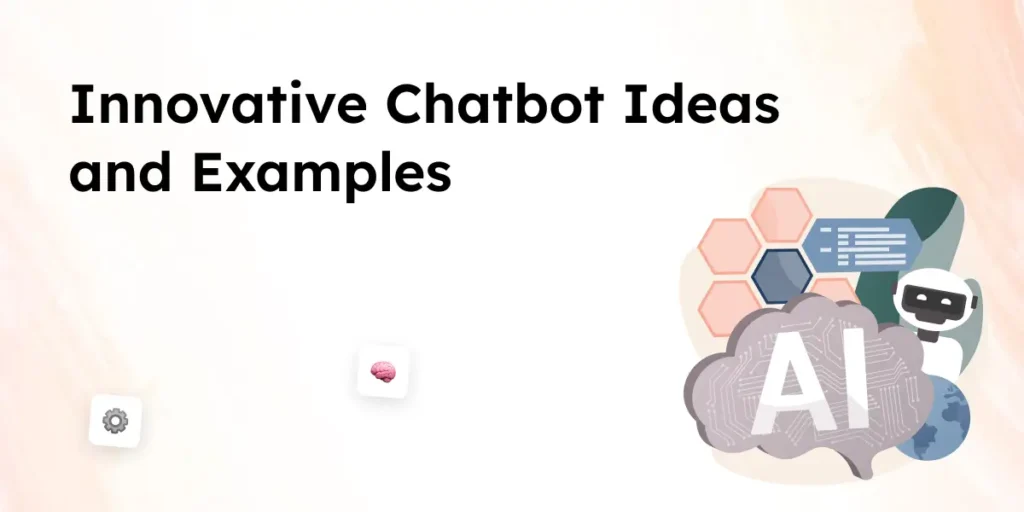Enterprise chatbots automate customer support and business operations by providing instant responses and handling repetitive tasks. Businesses use AI chatbots to improve customer engagement, streamline workflows, and integrate with enterprise systems like CRM and ERP tools. These chatbots enhance customer experience, provide insights into customer behavior, and personalize interactions using customer data. This article covers the best use cases, core technologies, and future trends of enterprise chatbots, along with their features and capabilities.
What Are Enterprise Chatbots?
Enterprise chatbots are AI-powered systems designed to handle customer interactions, automate workflows, and improve customer service teams’ efficiency. Unlike standard chatbots, they integrate with enterprise software, allowing businesses to enhance customer support, automate repetitive tasks, and improve customer experience.
These chatbots use conversational AI to provide intelligent responses, understand customer behavior, and analyze customer data. They work across different communication channels, including messaging platforms, websites, and apps. Businesses use enterprise chatbots for lead generation, self-service support, and automating employee assistance.
Key Points About Enterprise Chatbots:
- Enterprise chatbots are AI-driven tools that automate customer service and business workflows.
- They integrate with CRM, ERP, and other enterprise systems to enhance customer support.
- Conversational AI enables chatbots to provide intelligent responses and analyze customer data.
- Unlike rule-based chatbots, AI-powered enterprise chatbots learn and adapt to user interactions.
- Businesses use enterprise chatbots to improve customer engagement and reduce service costs.
How Enterprise Chatbots Work
Enterprise chatbots operate using advanced AI technologies to process customer inquiries, provide automated responses, and streamline interactions. These chatbots enable chatbots to engage with users across multiple platforms while integrating seamlessly with enterprise resource planning tools, customer relationship management systems, and messaging platforms.
Core Technologies Behind AI-Powered Enterprise Chatbots
The effectiveness of enterprise chatbots depends on AI-powered technologies that enhance automation and user interaction:
- Natural Language Processing (NLP): Helps chatbots understand customer behavior and respond in a human-like manner.
- Machine Learning (ML): Allows chatbots to learn from previous interactions, improving accuracy over time.
- Conversational AI Bots: Enable real-time customer engagement by interpreting and responding to inquiries.
- Generative AI: Enhances chatbot solutions by creating personalized responses.
- Data Analytics: Enterprise chatbots gather data to understand customer preferences and improve interactions.
How Chatbots Handle Customer Interactions
Enterprise chatbots are designed to process and respond to customer inquiries efficiently. They follow a structured workflow:
- User Input: A customer initiates a query through a messaging platform, website, or mobile app.
- Intent Recognition: AI chatbots analyze the input using NLP to determine the intent and context.
- Response Generation: The chatbot provides a relevant answer, pulling information from a knowledge base or previous interactions.
- Action Execution: If required, chatbots can also trigger tasks such as scheduling appointments, processing orders, or transferring inquiries to human agents.
- Data Collection: Chatbots gather data to improve customer service and support, ensuring personalized interactions in the future.
How Enterprise Chatbots Differ from Standard Chatbots
Enterprise chatbots offer advanced capabilities that set them apart from traditional rule-based chatbots:
- Scalability: Enterprise chatbots can handle multiple conversations at once, making them ideal for large businesses.
- Integration: They work seamlessly with enterprise systems like CRM and ERP platforms.
- Personalization: AI-powered chatbots use customer data to personalize responses and improve customer satisfaction.
- Automation: Chatbots streamline workflows by automating repetitive tasks and enabling chatbots to answer complex inquiries.
Enterprise chatbots significantly improve customer engagement by providing real-time support while optimizing business operations. Businesses that use chatbots for enterprise purposes benefit from enhanced efficiency, reduced service costs, and better customer experiences.
Best Use Cases for Enterprise Chatbots
Enterprise chatbots are transforming how businesses interact with customers and manage operations. They offer multiple use cases across various industries, improving customer support, automating workflows, and enhancing engagement. Chatbots work best when integrated with enterprise systems, enabling businesses to scale operations efficiently.
Customer Support and Service Automation
- Chatbots provide instant responses to customer inquiries, reducing wait times.
- AI-powered chatbots handle repetitive queries, allowing human agents to focus on complex issues.
- Enterprise chatbots can be used to improve customer satisfaction by offering 24/7 support.
Sales and Lead Generation
- Chatbots for lead generation engage prospects, answer product-related questions, and qualify leads.
- Conversational AI bots help guide customers through purchasing decisions.
- Chatbots gather data on customer behavior and preferences, improving conversion rates.
HR and Employee Assistance
- Enterprise chatbots streamline HR processes like onboarding, leave requests, and training.
- Chatbots can assist employees by providing quick access to company policies and internal resources.
- Chatbots operate within internal messaging platforms to improve productivity.
Customer Engagement and Personalization
- AI-powered chatbots analyze customer data to provide personalized recommendations.
- Chatbots can handle multiple customer interactions simultaneously, ensuring consistent engagement.
- Enterprise chatbots allow businesses to enhance customer experience by delivering targeted content.
E-commerce and Retail
- Chatbots to answer customer inquiries related to orders, refunds, and shipping.
- Enterprise bots recommend products based on customer behavior and past purchases.
- Chatbots reduce cart abandonment rates by guiding users through checkout.
Banking and Finance
- Chatbots can assist customers with transactions, account management, and security verification.
- Enterprise chatbots leverage AI to detect fraud and automate compliance-related tasks.
- Chatbots gather data on customer transactions to improve financial recommendations.
Healthcare and Telemedicine
- AI chatbots schedule appointments, provide medical advice, and send reminders.
- Conversational chatbots help patients access healthcare resources and insurance information.
- Chatbots can be used to monitor symptoms and assist with remote consultations.
Key Features of Enterprise Chatbots
Enterprise chatbots offer advanced features and capabilities that help businesses automate interactions, enhance customer engagement, and streamline operations. Unlike standard chatbots, enterprise chatbots are designed to integrate with enterprise systems, process large volumes of customer interactions, and provide personalized experiences.
AI-Powered Conversational Capabilities
- Conversational AI enables enterprise chatbots to understand and respond naturally to customer inquiries.
- AI chatbots continuously learn from interactions, improving their accuracy over time.
- Generative AI helps chatbots provide more personalized responses based on customer data.
Omnichannel Integration
- Enterprise chatbots work across messaging platforms, websites, and mobile apps.
- Businesses use chatbots to answer inquiries on multiple channels without losing context.
- Chatbots allow seamless transitions between automated and human-assisted support.
Advanced Customer Engagement Tools
- Chatbots can handle multiple interactions at once, improving customer experience.
- AI-powered chatbots analyze customer behavior and preferences to personalize recommendations.
- Enterprise chatbots provide insights into customer interactions to optimize engagement strategies.
Integration with Enterprise Systems
- Enterprise chatbots integrate with customer relationship management (CRM) platforms, enterprise resource planning (ERP) tools, and internal databases.
- They enable chatbots to access and utilize real-time customer data for better decision-making.
- Enterprise bots automate workflows, reducing manual intervention in customer service and support.
Security and Compliance
- Enterprise chatbots offer encryption and authentication features to protect customer data.
- AI chatbots adhere to regulatory requirements such as GDPR and HIPAA.
- Chatbots operate under strict security protocols, ensuring data privacy and trust.
Benefits of Using Enterprise Chatbots
Enterprise chatbots provide businesses with numerous advantages, from improving customer service efficiency to automating workflows. These AI-powered chatbots help enterprises reduce operational costs, enhance customer experience, and streamline interactions across multiple channels.
Enhance Customer Experience
- AI-powered chatbots improve customer interactions by providing instant responses.
- Enterprise chatbots can be used to personalize conversations based on customer data.
- Chatbots provide real-time support, leading to higher customer satisfaction.
Reduce Customer Support Workload
- Enterprise chatbots handle repetitive customer inquiries, allowing support teams to focus on complex issues.
- Chatbots can also assist agents by retrieving customer data from CRM systems.
- AI chatbots improve response times, ensuring efficient customer service and support.
Increase Operational Efficiency
- Chatbots streamline business processes by automating routine workflows.
- Enterprise chatbots leverage AI to manage high volumes of customer interactions without delays.
- Businesses use AI chatbots to enhance productivity and optimize resources.
Improve Customer Engagement
- Chatbots to engage customers through personalized recommendations and proactive support.
- AI chatbots understand customer behavior and preferences, improving user experience.
- Conversational AI bots help businesses provide consistent interactions across multiple channels.
Enable Data-Driven Insights
- Chatbots gather data on customer behavior, preferences, and interactions.
- AI-powered chatbots provide businesses with insights into customer trends and pain points.
- Enterprise chatbots make dashboards for real-time performance tracking.
Scalability and Cost Savings
- Enterprise chatbots can handle multiple conversations simultaneously, reducing the need for large support teams.
- AI-powered enterprise chatbots operate 24/7, eliminating the costs associated with human agents.
- Businesses using enterprise chatbots reduce support expenses while improving service quality.
Seamless Integration with Enterprise Systems
- Enterprise chatbots integrate with CRM, ERP, and messaging platforms for automated workflows.
- AI-powered chatbots allow businesses to manage operations efficiently with minimal human intervention.
- Chatbots handle transactions, scheduling, and other enterprise functions.
By implementing AI-powered chatbots, businesses can improve customer engagement, enhance service quality, and optimize operations. The benefits of using enterprise chatbots go beyond customer service, making them essential for enterprise-wide automation and efficiency.
Types of Chatbots for Enterprise Use
Enterprise chatbots come in different types, each serving a specific function based on business needs. While some chatbots operate on predefined rules, others use AI to provide advanced automation and conversational experiences. Understanding these types helps businesses choose the right chatbot solution for their operations.
1. Rule-Based Chatbots
- Follow predefined workflows and respond based on scripted rules.
- Work best for handling simple, repetitive customer inquiries.
- Used in FAQs, ticket routing, and structured decision-making processes.
2. AI-Powered Chatbots
- Use machine learning and NLP to interpret customer interactions.
- AI chatbots improve over time by learning from previous conversations.
- Enable chatbots to understand and predict user needs.
3. Conversational Chatbots
- Use conversational AI to provide human-like interactions.
- Understand context, tone, and intent, enhancing customer engagement.
- Chatbots to access and utilize customer data for personalization.
4. Hybrid Chatbots
- Combine rule-based and AI chatbot features.
- Chatbots can assist customer service teams by automating common tasks while allowing human takeover when needed.
- Used for enterprise chatbot solutions that require flexibility and personalization.
5. Industry-Specific Chatbots
- Designed for specific industries such as healthcare, banking, and e-commerce.
- AI-powered chatbots streamline industry processes like claims processing, appointment scheduling, and financial advisory.
- Enterprise chatbots provide tailored responses based on sector-specific needs.
How to Choose the Right Enterprise Chatbot for Your Business
Selecting the right enterprise chatbot depends on business needs, customer expectations, and integration capabilities. A well-implemented chatbot solution can enhance customer interactions, automate workflows, and improve operational efficiency. Businesses must evaluate their requirements to ensure they deploy the best chatbot solution.
Business Goals and Use Cases
- Identify the best use cases for enterprise chatbots in customer support, sales, HR, or internal automation.
- Enterprise chatbots can improve customer satisfaction by providing instant responses and automating routine inquiries.
- Determine whether you need AI-powered chatbots or rule-based chatbots based on complexity.
Conversational AI Capabilities
- Conversational AI bots should be able to understand and respond naturally to customer interactions.
- AI-powered chatbots use NLP and machine learning to provide relevant answers.
- Chatbots improve customer experience by delivering personalized recommendations.
Integration with Enterprise Systems
- Chatbots must integrate seamlessly with CRM, ERP, and messaging platforms.
- Enterprise chatbots allow businesses to automate workflows and retrieve real-time customer data.
- Using enterprise chatbots ensures smooth operations without disrupting existing systems.
Security and Compliance
- AI chatbots should follow data privacy regulations and ensure customer data protection.
- Enterprise bots must support authentication protocols for secure customer interactions.
- Enterprise chatbots are designed to comply with industry security standards.
Scalability and Performance
- Enterprise chatbots must handle multiple customer inquiries simultaneously.
- Chatbots can also assist customer service teams in managing peak demand efficiently.
- AI-powered enterprise chatbots optimize response times and workload distribution.
Analytics and Continuous Improvement
- Chatbots gather data to provide insights into customer behavior and preferences.
- Enterprise chatbots leverage analytics to refine responses and enhance engagement.
- Businesses should monitor chatbot performance to improve customer interactions over time.
The Future of Enterprise Chatbots
The future of enterprise chatbots is driven by advancements in AI, machine learning, and automation. Businesses are increasingly adopting AI-powered enterprise chatbots to enhance customer engagement, streamline operations, and optimize decision-making. As conversational AI continues to evolve, enterprise chatbots will play a more significant role in transforming digital interactions.
Increased Use of Generative AI
- Generative AI enhances chatbot solutions by enabling dynamic and context-aware responses.
- AI chatbots will better understand customer interactions, reducing the need for human intervention.
- Enterprise chatbots can also leverage AI to predict customer behavior and preferences.
Seamless Integration with Enterprise Systems
- Future enterprise chatbots will integrate more deeply with enterprise resource planning (ERP) and customer relationship management (CRM) platforms.
- Chatbots can access and utilize customer data in real time to enhance service efficiency.
- Businesses will use AI chatbots to manage operations, reducing dependency on manual processes.
Enhanced Personalization and Customer Experience
- AI-powered chatbots will use advanced analytics to understand customer behavior and preferences.
- Enterprise chatbots improve customer satisfaction by delivering tailored recommendations and proactive support.
- Businesses will leverage chatbots to engage customers with hyper-personalized interactions.
Expansion into More Use Cases
- Chatbots can handle complex processes such as financial advisory, healthcare diagnostics, and compliance management.
- AI chatbots will streamline enterprise-wide communication by assisting employees with scheduling, data retrieval, and decision-making.
- Chatbots allow businesses to automate customer service and support at scale.
Voice and Multimodal Capabilities
- Enterprise chatbots are revolutionizing customer interactions by incorporating voice recognition and multimodal capabilities.
- AI-powered chatbots will support voice commands, enabling hands-free assistance across industries.
- Chatbots will operate seamlessly across messaging platforms, voice assistants, and smart devices.
Conclusion
Enterprise chatbots help businesses automate interactions, enhance customer engagement, and streamline operations. By integrating with enterprise systems, these AI-powered chatbots improve customer experience, optimize workflows, and reduce operational costs. They provide real-time support, automate repetitive tasks, and personalize interactions.
As AI continues to evolve, enterprise chatbots will offer deeper system integrations, better customer insights, and enhanced personalization. Businesses that adopt AI chatbot solutions can improve efficiency, scale operations, and gain a competitive edge. Choosing the right chatbot solution ensures long-term success and improved customer service. For enterprise-level chatbot success, implement scalable AI chatbot strategies. Check out our comprehensive guide.
FAQs
1. What industries benefit the most from enterprise chatbots?
Enterprise chatbots are widely used across various industries, including e-commerce, banking, healthcare, SaaS, and customer service. Businesses in these sectors use AI-powered chatbots to automate customer support, handle inquiries, and enhance engagement. Chatbots can also assist with internal workflows in HR, IT, and operations, making them valuable for enterprises of all types.
2. How do AI-powered enterprise chatbots integrate with CRM tools?
Enterprise chatbots integrate with customer relationship management (CRM) tools by accessing and utilizing customer data to provide personalized responses. They can retrieve past interactions, analyze customer behavior, and update CRM records in real-time. This integration helps businesses improve customer engagement and streamline sales and support operations.
3. What is the cost of implementing an enterprise chatbot solution?
The cost of an enterprise chatbot varies depending on its complexity, AI capabilities, and integration requirements. Basic rule-based chatbots are more affordable, while AI-powered enterprise chatbots with machine learning and natural language processing tend to be more expensive. Businesses should evaluate their needs and choose a chatbot solution that offers the best return on investment.
4. How do chatbots help reduce customer churn?
Enterprise chatbots improve customer satisfaction by providing quick and efficient responses to inquiries. AI-powered chatbots understand customer preferences, personalize interactions, and resolve issues faster, which enhances customer experience. By offering proactive support and engagement, chatbots can help businesses retain customers and reduce churn.
5. What are the risks and challenges of using enterprise chatbots?
Some challenges of enterprise chatbots include data security concerns, AI training limitations, and the risk of misinterpreting complex queries. Businesses need to ensure that their chatbots comply with data protection regulations and continuously refine AI models to improve accuracy. Additionally, integrating chatbots with existing enterprise systems can require significant technical expertise.



